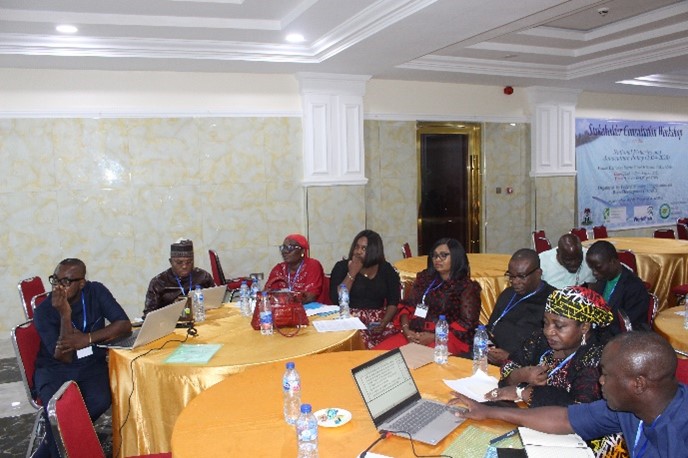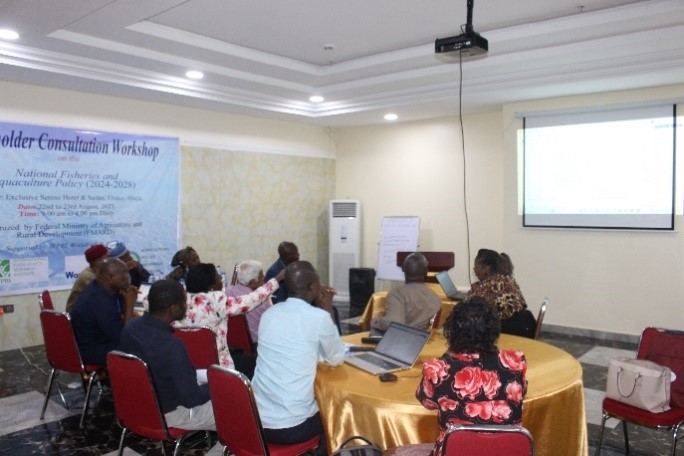
Photo credit: Onilogbo Omobolanle/IFPRI
The International Food Policy Research Institute (IFPRI), Abuja Office participated in a two-day (22-23 Aug. 2023) stakeholders’ consultation workshop on the National Fisheries and Aquaculture Policy (2024 -2028) organized by the Federal Ministry of Agriculture and Food Security (FMAFS) with the support of the CGIAR Initiative on Aquatic Foods led by IFPRI and the WorldFish. Specifically, the objectives of the workshop were to: (1) share data, evidence/research findings, and experiences among participants; (2) inform policy directions for the fisheries and aquaculture sector; (3) get a consensus on the major issues and debate on the policy solutions and required investments ; (4) get a consensus on the vision, objectives, and elements of the policy ; (5) get a consensus on the performance indicators, targets and establish a monitoring and evaluation framework for the policy; and, (6) get inputs from experts and key stakeholders on the situation analysis of Nigeria’s fisheries and aquaculture sector.

Photo credit: Onilogbo Omobolanle/IFPRI
Catherine Ragasa, Senior Research Fellow, IFPRI-Washington commenced the workshop with an opening remark and workshop overview. She highlighted the essence and the need for the stakeholders’ workshop to review the fisheries and aquaculture policy for Nigeria. The Country Program Leader, IFPRI-Nigeria, Kwaw Andam, in his goodwill message applauded the effort of FMAFS and other partners towards the drafting of the Fisheries and Aquaculture Policy, and encouraged all stakeholders to fully participate and contribute to the review of the draft policy document as a deliberate effort towards revamping the sub-sector. The Honorable Ministers of Agriculture and Food Security, and Marine and Blue Economy both represented by the Director, Department of Fisheries and Aquaculture, Mr. Omaragbon Wellington gave a goodwill message. The Honorable Minister of Water Resources represented by Mrs. Mercy Odu in her remarks said, “there is a state of emergency on food security in the country; this policy will help Nigerians, not just in terms of fish availability but achieving economic growth”.
After the goodwill messages followed a series of presentations from different stakeholders on various issues in the sector and question-and-answer sessions after each presentation. Olufemi Popoola, a Research Analyst at IFPRI Nigeria, in his presentation on “Sustainable growth for the Nigerian aquatic food system – sources, projections, scenarios” discussed on the sources of growth for the sector, investments needed, data gaps and policy direction for the sector.
Day-two of the workshop was largely dedicated to break-out sessions for co-creation, in-depth discussions and inputs on the thirteen policy sub-themes contained in the draft policy document: (1) aquaculture development; (2) artisanal fisheries (3) fisheries resources monitoring control, surveillance and conservation; (4) industrial fisheries development; (5) fish trade; (6) quality control and assurance management; (7) fish preservation and product development policy; (8) fish disease control and management; (9) fisheries and aquaculture extension services; (10) fisheries technology; (11) training and manpower; (12) fisheries research; and (13) dams, lakes, reservoirs and lagoons, and fisheries development. This was followed by four panel sessions to discuss feedbacks, reflections, and inputs made to the draft policy document. Prof. Anthony Onoja of the Agricultural Policy Research Network (APRNet), who leads the policy drafting team, gave the closing remarks on the next steps on the draft policy on the National Fisheries and Aquaculture Policy (2024-2028).
Participants in breakout sessions during the stakeholders’ workshop.
Photo credit: Onilogbo Omobolanle/IFPRI



